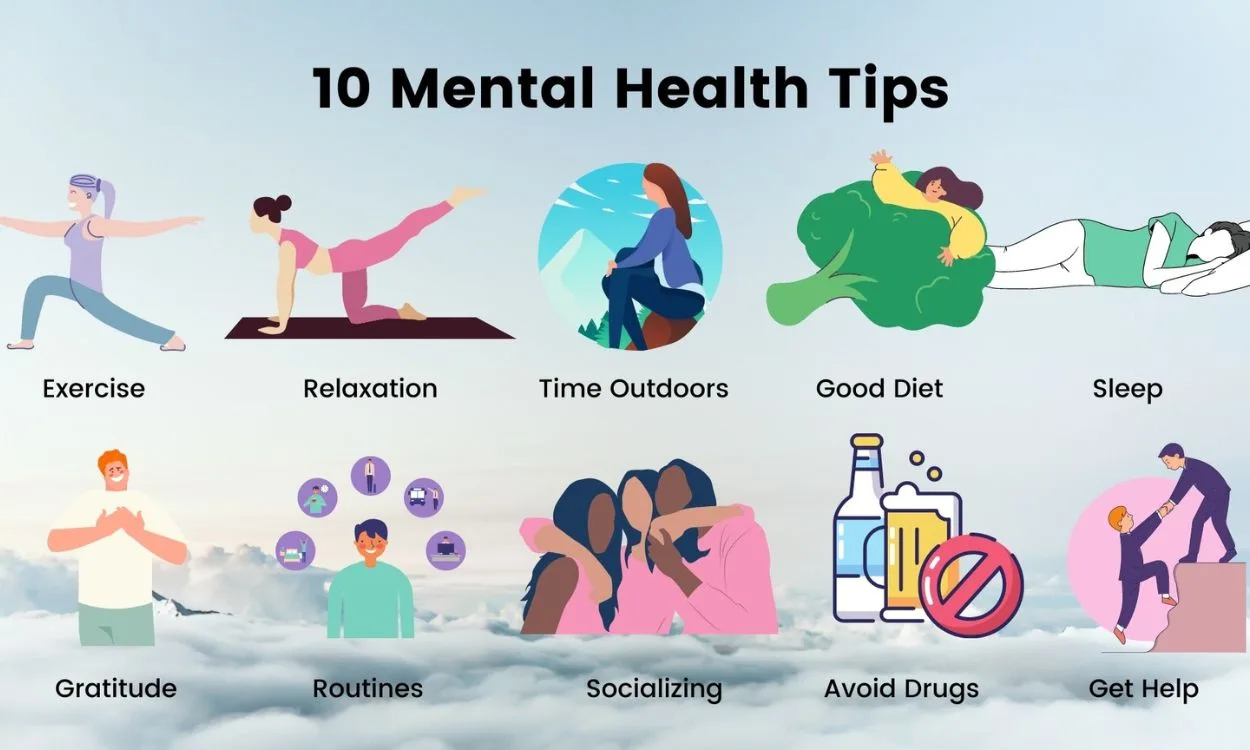10 Relaxation Techniques for Improving Mental Well-being
Introduction
In today’s fast-paced and stressful world, taking care of our mental well-being is more important than ever. Relaxation techniques are proven methods to reduce stress, anxiety, and promote a sense of calm and balance in our lives. In this article, we will explore ten effective relaxation techniques that can help improve your mental well-being. So, take a deep breath, find a comfortable spot, and let’s dive in!
1. Deep Breathing
Deep breathing is a simple yet powerful relaxation technique that can be done anywhere, anytime. Start by taking a slow, deep breath through your nose, allowing your belly to expand. Hold the breath for a moment, and then exhale slowly through your mouth. Repeat this process several times, focusing on the sensation of your breath flowing in and out. Deep breathing can help calm your mind, reduce tension, and bring about a sense of relaxation.
2. Progressive Muscle Relaxation
Progressive Muscle Relaxation (PMR) is a technique that involves tensing and then releasing each muscle group in your body, one at a time. Start with your toes, gradually working your way up to your head. Tense each muscle group for a few seconds, and then relax them completely. Pay attention to the difference in sensation between tension and relaxation. PMR can help release physical tension and promote a sense of overall relaxation.
3. Mindfulness Meditation
Mindfulness meditation is a practice that involves focusing your attention on the present moment without judgment. Find a quiet place, sit comfortably, and bring your attention to your breath, sensations in your body, or any other object of focus. When your mind wanders, gently bring it back to the present moment. Regular practice of mindfulness meditation can help reduce stress, increase self-awareness, and improve overall mental well-being.
4. Guided Imagery
Guided imagery is a relaxation technique that involves using your imagination to create a peaceful and calming mental image. Close your eyes and imagine yourself in a serene and beautiful place, such as a beach or a forest. Engage all your senses to make the image as vivid as possible. Stay in this imaginary place for a few minutes, allowing yourself to experience the relaxation and tranquility it brings.
5. Yoga and Stretching
Yoga and stretching can be great ways to relax both your body and mind. Practice gentle yoga poses or stretching exercises that focus on releasing tension in your muscles and promoting flexibility. The combination of physical movements, deep breathing, and mindful awareness can help reduce stress, improve circulation, and enhance your overall well-being.
6. Journaling
Writing down your thoughts and feelings in a journal can be a therapeutic way to relax and gain clarity. Set aside some time each day to write freely about your emotions, experiences, or anything that comes to mind. Use this opportunity to reflect on your day, express gratitude, or explore your inner thoughts. Journaling can help you process emotions, reduce stress, and gain a better understanding of yourself.
7. Listening to Relaxing Music
Music has a powerful effect on our emotions and can be a great tool for relaxation. Create a playlist of soothing and calming music that resonates with you. Find a quiet place, put on your headphones, and allow yourself to get lost in the melodies and rhythms. Listening to relaxing music can help slow down your breathing, lower your heart rate, and create a sense of peace and tranquility.
8. Engaging in Creative Activities
Engaging in creative activities can be an excellent way to relax and unwind. Whether it’s painting, drawing, playing a musical instrument, or crafting, allow yourself to get lost in the process of creating something. Creative activities can help you focus your mind, stimulate your imagination, and provide a sense of fulfillment and joy.
9. Practicing Gratitude
Gratitude is a powerful practice that can shift your focus from negativity to positivity. Take a moment each day to reflect on the things you are grateful for. It could be as simple as a warm cup of tea, a beautiful sunset, or the support of loved ones. Cultivating a grateful mindset can help reduce stress, increase happiness, and improve your overall well-being.
10. Connecting with Nature
Spending time in nature can have a profound impact on your mental well-being. Take a walk in a park, go for a hike, or simply sit under a tree and observe the beauty of the natural world. Connecting with nature can help lower stress levels, improve mood, and promote a sense of peace and tranquility.
Conclusion
Incorporating relaxation techniques into your daily routine can have a transformative effect on your mental well-being. Whether it’s deep breathing, meditation, creative activities, or spending time in nature, find what works best for you and make it a priority. Prioritizing your mental well-being is crucial for leading a balanced and fulfilling life.
Now, if you’re ready to take the next step on your journey to improved mental well-being, consider downloading the Fitpaa app. Fitpaa offers a comprehensive approach to health and fitness, combining personalized plans, expert guidance, and state-of-the-art technology to help you achieve your goals. With Fitpaa, you’ll have access to a team of fitness coaches, nutritionists, and doctors who will support you every step of the way. So, why wait? Take control of your mental well-being and start your journey towards a healthier, happier you with Fitpaa.









